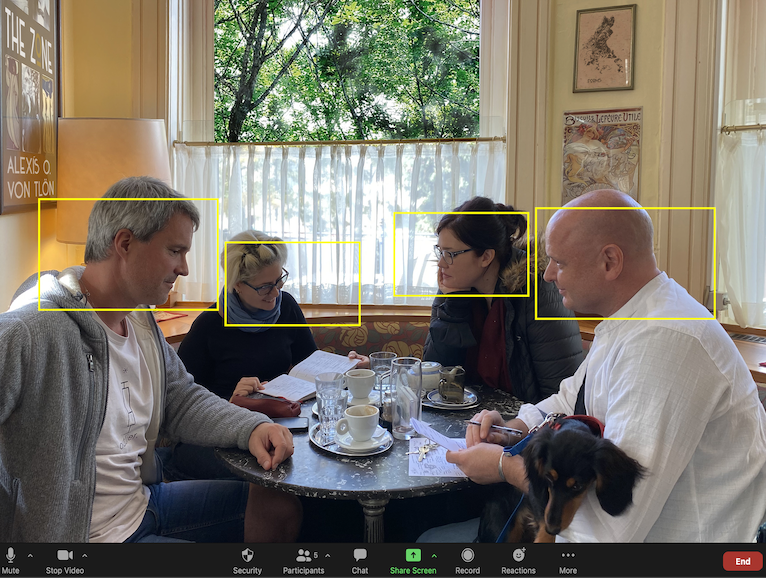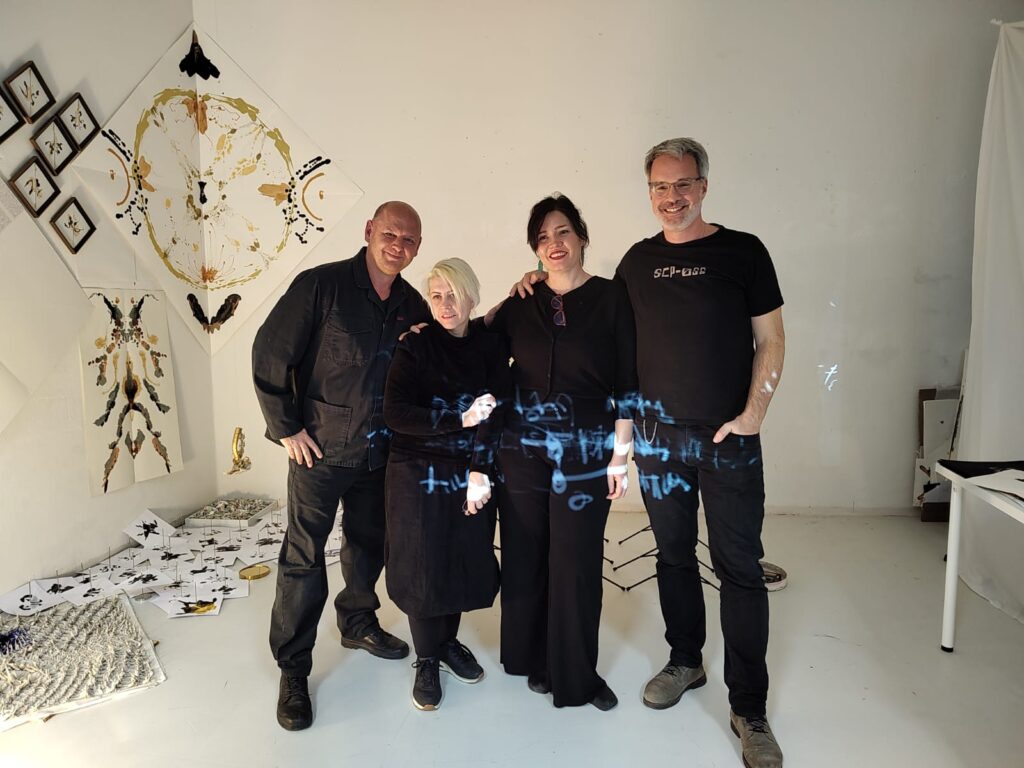
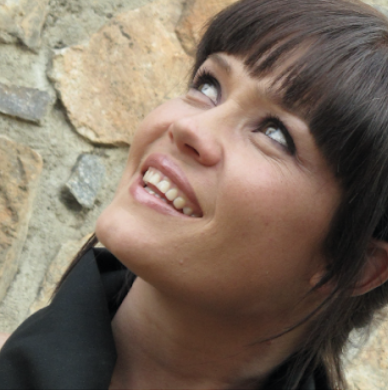
Bronwyn Lace (1980, Botswana) completed her Bachelor of Arts in Fine Arts at the University of Witwatersrand, Johannesburg in 2004.
Site specificity is one of the things that stirs her imagination into life. Lace focuses her practice on the relationships between art and other fields, including physics, museum practice and philosophy. She elects to work with found, recycled and repurposed elements and often builds her intricate installations responsively and in situ.
Lace’s exhibitions include 2019 CrossSections and Climbing Through The tide, a group exhibition curated by Başak Senova travelling from Tunis, Tunisia to Stockholm, Sweden to Helsinki, Finland; 2018 : MIRROR | MIRROR, a solo exhibition at Everard Read, Johannesburg, South Africa; 2017: Bred in the Bone, a solo exhibition at Circa, Cape Town, South Africa; Dead Gardens, a group show curated by Olimpia Bera, Cluj Napoca, Romania; 2016: KulturKontakt, a group exhibition as part of the Austrian Federal Chancellery 2016 residency, Vienna, Austria; Bronze, Steel and Stone, group exhibition at Everard Read, London, UK; 2015: Response, a two person exhibition, Johannesburg, South Africa; Response, an exhibition presentation delivered at the National Smithsonian Museum of African Art, Washington, USA; 2014: Teeming, solo exhibition at SpekePhotographic, Johannesburg, South Africa; 2013: Resuscitate, solo exhibition at Nirox Project Space, Johannesburg, South Africa; 2012: A Tendency Towards Complexity, solo exhibition at CIRCA on Jellico, Johannesburg, RSA.
In 2013, Lace co-completed a commissioned book and film related to collaborative community projects she has co-initiated in South Africa. Lace is currently the co-director of The Centre for the Less Good Idea, an interdisciplinary incubator space for the arts based in Johannesburg, South Africa. Founded by William Kentridge, the Centre creates and supports experimental, collaborative and cross-disciplinary arts projects. Lace lives and works in Vienna, Austria.
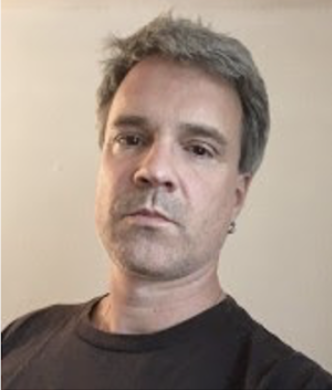
Johannes “Yogi” Jaeger (b. 1973, Switzerland) is an evolutionary systems biologist, natural philosopher, and educator whose work bridges the worlds of science, art, and philosophy. Trained as a geneticist and systems biologist, he has spent his career exploring how living systems evolve, learn, and generate meaning—questions that connect the life sciences with human creativity.
Yogi studied biology at the Universities of Zurich and Basel, holds an MSc in Holistic Science from Schumacher College (Devon, UK), and earned a PhD in genetics from Stony Brook University (New York, USA) in 2005. He worked as a research fellow at the University of Cambridge, then led an interdisciplinary group at the Centre for Genomic Regulation (CRG) in Barcelona (2008–2015), investigating how gene networks shape the evolution of form and function in different species of flies.
He has held fellowships and research appointments across Europe and beyond, including at the Institute for Advanced Study (Wissenschaftskolleg) in Berlin, the Konrad Lorenz Institute for Evolution and Cognition Research (KLI) near Vienna (where he served as director from 2015–2017), the Max Planck Institute for Cell Biology and Genetics in Dresden, the Centre de Recherches Interdisciplinaires (Learning Planet Institute) in Paris, the Stellenbosch Institute for Advanced Study (STIAS) in South Africa, and the Institut d’Études Avancées (IEA) in Paris, where he held the D’Alembert Research Chair. From 2023 to 2025, he led the “Pushing the Boundaries” project at the Dept. of Philosophy of the University of Vienna, exploring the evolution of organismic agency, funded by the John Templeton Foundation.
Yogi is the author of more than 50 scientific papers in leading journals (Nature, eLife, PLoS Biology, Biology & Philosophy, among others) and is associate faculty at the Complexity Science Hub Vienna. His work combines organismic systems biology, complexity theory, and philosophy to develop a transdisciplinary perspective on evolution and life.
He is currently writing “Beyond the Age of Machines“—a book envisioning a 21st-century science that no longer views the world as a machine. He also gives workshops on creativity, philosophy, and scientific thinking at institutions across Europe, and has been active in arts–science collaborations, including projects published in Leonardo (MIT Press).
From 2011 to 2025, Yogi has directed the Venice Summer School in Evolutionary Developmental Biology and continues to inspire new dialogues between art, science, and philosophy—seeking ways to reimagine our place in an evolving, living world.
Johannes Jaeger home page: https://www.johannesjaeger.eu
Johannes Jaeger Google Scholar Profile: https://scholar.google.com/citations?user=Wk8kppcAAAAJ&hl=en
Beyond Networks lecture series: https://youtube.com/playlist?list=PL8vh-kVsYPqOKJOboONJIQBd8ds0ueM_W
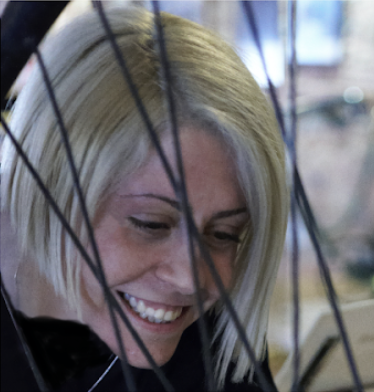
Basak Senova is a curator and designer. She studied Literature and Graphic Design (MFA in Graphic Design and Ph.D. in Art, Design and Architecture at Bilkent University) and attended the 7th Curatorial Training Programme of Stichting De Appel, Amsterdam. As an assistant professor, she lectured in various universities in Turkey and in 2017 she was the resident fellow at the University of the Arts, Helsinki in co-operation with HIAP and Associate Professorship by the Higher Education Council of Turkey. Curently, she is a Visiting Professor at the University of Applied Arts, Vienna (Universität für Angewandte Kunst Wien) and also teaches a seminar course “Case Studies” for Master students at the Academy of Fine Arts Vienna (Akademie der Bildenden Künste Wien).
Senova has been writing on art, technology and media, initiating and developing projects and curating exhibitions since 1995. She is one of the founding members of NOMAD, as well as the organizer of “ctrl_alt_del” sound art project and “Upgrade!Istanbul”. She is the editor of art-ist 6, Kontrol Online Magazine, Lapses book series, UNCOVERED, Aftermath, Obje’ct, The Move, The Translation, Scientific Inquiries, Cultural Massacre, Ahmet Elhan-Ground Glass and Lines of Passage (in medias res) among other publications. Senova is one of the editorial correspondents of ibraaz.org and Turkish correspondent of Flash Art International. She curated Zorlu Center Collection for two years (2011-2012) by also acting as the editor of its publications. Senova acted as an advisory board member of the Turkish Pavilion in Venice Biennial and also the Istanbul Biennial. She is a member of the editorial board of Pass, International Biennial Association’s (IBA) journal.
Senova was the curator of the Pavilion of Turkey at the 53rd Venice Biennale. She co-curated the UNCOVERED (Cyprus, 2011-2013); the 2ndand 5th Biennial of Contemporary Art, D-0 ARK Underground (Bosnia and Herzegovina, 2013 and 2019). She acted as the Art Gallery Chair of (ACM) SIGGRAPH 2014 (Vancouver) the curator of the Helsinki Photography Biennial 2014 and the Jerusalem Show VII: Fractures (2014). In 2015, she curated the Pavilion of Republic of Macedonia at the 56th Venice Biennale, in 2016, Lines of Passage (in medias res) Exhibition in Lesvos and in 2019 the inaugural exhibition of B7L9, Climbing through the Tide in Tunis. Senova completed a long-term research-based art project CrossSections that took place in Vienna, Helsinki, and Stockholm (2017- 2019). At the moment she is running a research-based educational programme “The Octopus Programme” at the University of Applied Arts, Vienna (Universität für Angewandte Kunst Wien).
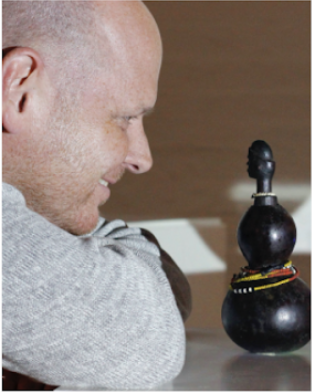
Marcus Neustetter (1976, Johannesburg) earned his undergraduate and Masters Degree in Fine Arts (2001) from the University of the Witwatersrand.
Interested in cross-disciplinary practice, site-specificity, socially engaged interventions and the intersection of art and activism, Neustetter has produced projects, performances and installations across Africa, Europe, America and Asia that search for a balance between poetic form and asking critical questions.
Accolades include: World Technology Award for the Arts 2015, NY; Artist Fellow, the Smithsonian National Museums of African Art and Air and Space, Washington DC; Sweep, public performance commission, UNESCO International year of Light, Mexico; Renaming the City, commission for Ars Electronica Festival, Austria; Into the Light, solo exhibition, Wits Art Museum, South Africa; Absent Collection, installation, Cairotrinca, Egypt; Sud Triennial 2014/2017 participant, Cameroon; Vents de Rose Numerique participant, Senegal, Mali and Martinique; Temporary Museum of Art, Havana Biennial, Cuba; artistic director of ISEA2018Durban, South Africa; Searching Darkness, ISEA2019, South Korea; Award-winning planetarium show The Vertical Journey, South Africa; large-scale permanent public and private commissions in Johannesburg and Cape Town; Imaginary Futures, commissioned virtual experience performances in response to COVID19, Bloemfontein, South Africa.
Neustetter has been the co-director of the contemporary art production collaboration The Trinity Session since 2000, and is an adjunct professor with Nelson Mandela University. He lives and works between Johannesburg and Vienna.
